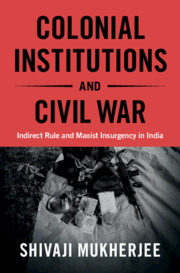Book contents
- Colonial Institutions and Civil War
- Cambridge Studies in Contentious Politics
- Colonial Institutions and Civil War
- Copyright page
- Contents
- Figures
- Tables
- Acknowledgments
- Part I Theory
- Part II Qualitative and Quantitative Testing
- Part III Generalizability
- 9 Explaining Partial Success of Maoists in Kerala and Karnataka
- 10 Frontiers of Empire: Indirect Rule and Insurgency in Burma and Pakistan
- 11 Conclusion: Policy Implications and Future of the Maoist Conflict
- Bibliography
- Index
- Series page
11 - Conclusion: Policy Implications and Future of the Maoist Conflict
from Part III - Generalizability
Published online by Cambridge University Press: 15 May 2021
- Colonial Institutions and Civil War
- Cambridge Studies in Contentious Politics
- Colonial Institutions and Civil War
- Copyright page
- Contents
- Figures
- Tables
- Acknowledgments
- Part I Theory
- Part II Qualitative and Quantitative Testing
- Part III Generalizability
- 9 Explaining Partial Success of Maoists in Kerala and Karnataka
- 10 Frontiers of Empire: Indirect Rule and Insurgency in Burma and Pakistan
- 11 Conclusion: Policy Implications and Future of the Maoist Conflict
- Bibliography
- Index
- Series page
Summary
The book ends by asking if there are any policy implications of my theory based on colonial institutions. A likely criticism of my theory is that the structural conditions created by colonialism are persistent and sticky and cannot be changed by the government. I show there are policy implications, for example, if political parties are really committed to land reforms as in Kerala and Karnataka, they can reverse some of the pernicious effects of indirect rule and indirect land tenure. Another possible critique of my theory is whether it can explain recent violence patterns of the Maoist conflict. The level of Maoist violence has declined since 2013-14, and the number of surrenders by Maoist cadres has increased in recent years, but low-level violence and attacks against security forces continue. The Maoist insurgency falls into the pattern of low-intensity but persistent insurgencies like the Kashmir and northeast insurgencies in India. While my theory based on colonial legacies is supposed to explain only the initial spatial variation of insurgency, and not its expansion and patterns of violence, it allows us to explain persistence and historical recurrence of conflict.
Keywords
- Type
- Chapter
- Information
- Colonial Institutions and Civil WarIndirect Rule and Maoist Insurgency in India, pp. 349 - 362Publisher: Cambridge University PressPrint publication year: 2021



